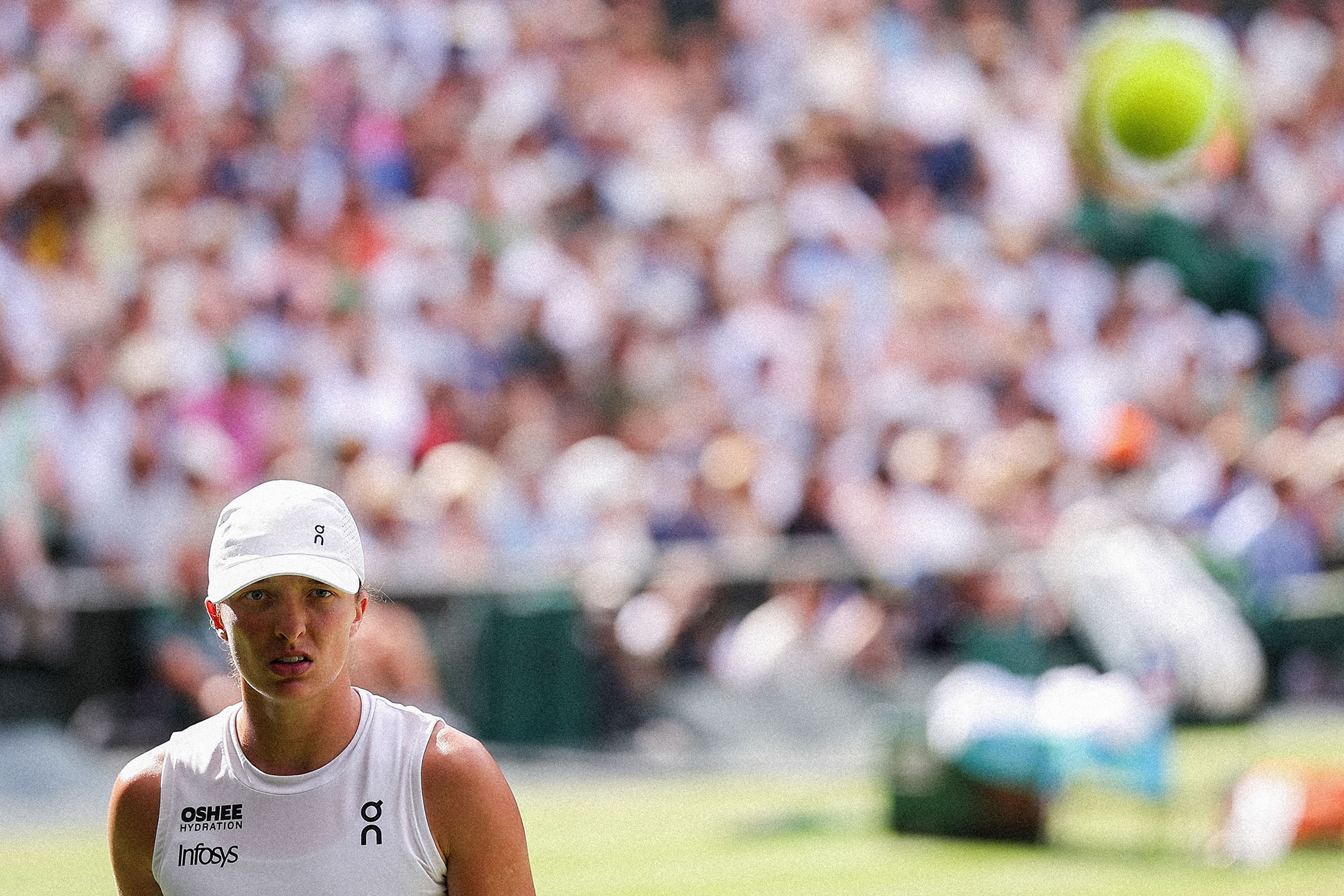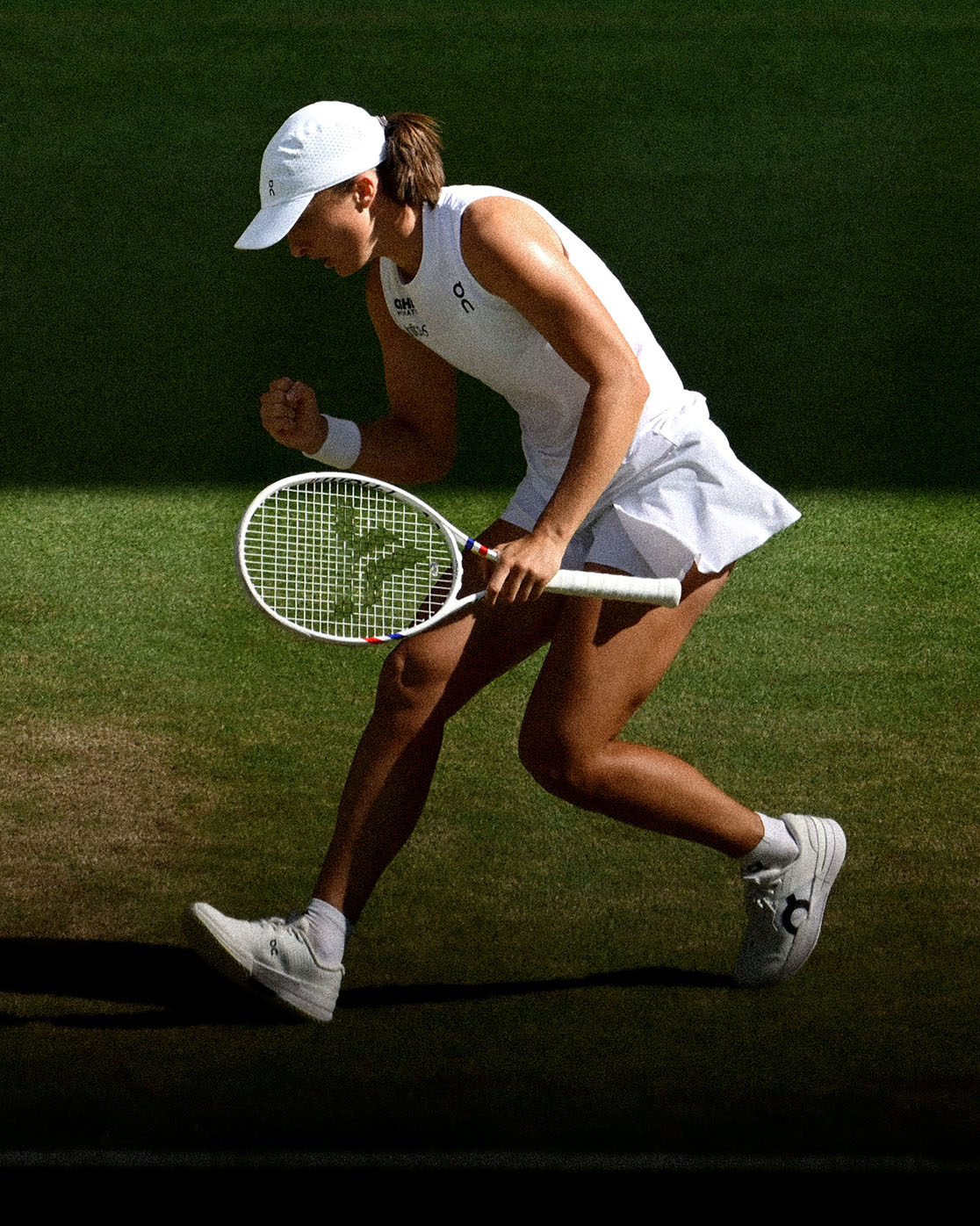Iga Swiatek's Hard Reset
Iga Swiatek's Hard Reset
She needed one. Her team obliged.
She needed one. Her team obliged.
By Carole BouchardJuly 18, 2025

Iga Świątek buckles down during the Wimbledon final. // Getty

Iga Świątek buckles down during the Wimbledon final. // Getty
You don’t go from losing one of your best shots (the forehand) on a surface you have dominated on (clay) to finding it again mere weeks later on the surface that supposedly bedevils you the most (grass) without some kind of major intervention.
Sure, as Iga Swiatek’s coach, Wim Fissette, explained during Wimbledon, her team tweaked her serve and forehand and made adjustments to her footwork this spring, and that work was a key factor in Iga’s triumph on Centre Court on Saturday. However, we know that to be a champion the results won’t come without the proper mindset, no matter how much you tweak their actual games.
I spoke with Swiatek’s team after the Wimbledon final to understand just how they had rebooted her system. A few days before the final, Fissette had told me that the former world No.1 “wasn’t herself” this year until Paris. “In Madrid and Rome, she was probably at her worst from the past years,” he said. Daria Abramowicz, her performance psychologist, confirmed that the team sat Swiatek down and told her—and each other—some hard truths. It looks to me like Swiatek’s hard truths were about how her attitude needed to change.
“The big moment actually was between Rome and Paris,” Abramowicz said. “We had a few difficult conversations within the team, and the one thing that I can tell you about Iga is that she can listen to the tough stuff, and she embraces it. That also says a lot about her as an athlete and a human being. In Paris, we could see adjustments in the attitude, work, and mindset, on court, off the court, and I immediately thought that we were going in the right direction.”
Since then, Swiatek’s error count and her impatience and frustration on court have decreased. “It’s more a mindset of, ‘Winning is one thing, but now how am I becoming a better tennis player?’” Fissette said. “It’s better to be focused on that than be like, ‘I need to win every tournament.’ You need to become a better tennis player, and then the rest will follow.”
The reset worked so well that Swiatek returned to work with a huge hunger to improve, despite the loss in Paris. “After Roland-Garros, she jumped into the work, which was good to see and hear,” said Abramowicz. “She put in a lot of work in terms of attitude and reframing some beliefs. There was no turning point, but the process gradually changed since Rome. There can be a certain amount of grit that sometimes also changes into stubbornness, with obviously more than a bit of perfectionism. The question is how to approach these situations and how to reframe. I just tried to show her how good of an athlete she can be, because that’s still the territory that we can discover.”
Iga finally accepted the changes her coach wanted to make. Nothing better than losing to be convinced, which is logical: When you’ve been winning that much, why would you believe you need to change? That was the other pivotal moment in the coach-and-player trust situation: the match against Elena Rybakina in Paris. A few steps back on the return and a win; that’s all it took after that discussion with the team for Swiatek to give up on what has also made her the player she is: her stubbornness.
“When you start working with someone, you cannot ask them to trust you,” Fissette said. “It has to come naturally, and with Iga having so much success with the previous coach, it was not easy. I had to work hard and find my moment to make a difference. I believe in my ideas, but I also keep adjusting to what’s the right approach with the player. Finding the right moment to make a change, which is not easy, but the Rybakina match in Paris was a huge turning point where she realized what I was saying was working.”
The team also challenged Iga’s limiting beliefs. She admitted she never believed she could win Wimbledon, for example. She also told Fissette, from the beginning, that “fast serve is just not for me.” How can such a champion not believe the sky is the limit—and how it was up to her team to believe when she wouldn’t?
Maciej Ryszczuk, Swiatek’s fitness coach and physiotherapist, was surprised by how she agreed to it all after losing in Paris. “It was a surprise for everyone,” he told me. “Especially on this surface, believing that she can do it, because it was the crucial part. The game was there, but she was struggling with her mental side. We just adjusted the footwork to decelerate a little bit more, with a bit less sliding, to be prepared quicker for the ball. And that’s it. She had it from the beginning, but she needed to believe it.”
People underestimate the strength of Iga Swiatek’s personality and how reluctant she is to change until she has seen proof that it’s needed. “As soon as these top players make the click of first believing and then feeling that the choice is right, then it’s always, ‘Okay, let’s go for it,’ and so it can go fast,” Fissette said. People also underestimate how tough it’s been for her to adjust to a new coach, new ideas, new losses, and so many changes. Fissette told me he had to learn how to talk to her, how to respect her process. I asked Abramowicz what it had meant for her work with Swiatek.
“I’ve never spoken so much to any other coach before,” she told me. “We talk so much about communication, because for Iga, the challenge is having a first non-Polish coach. I try to prepare her through mental training in English, with various tasks in English, so that when she’s under stress and pressure, she can transition into English. However, on the court, you can still see her revert to Polish when under pressure or being overwhelmed by emotions. So we try to develop protocols, patterns, and systems. She also appreciates having a reason for what she’s doing. She likes to understand, speak up, and she asks questions more than ever before, which is something I want to see in terms of environmental mastery and communication within the team. She learned how to manage the team, how to communicate, how to exactly follow whatever she wants, but also to embrace tough things and be able to listen to them.”
Sure, they would have preferred the reset to start hitting hard for Roland-Garros, but seeing how visibly more free Swiatek has been swinging out there throughout Wimbledon, one can wonder if, for the reset to work fully, she needed to clear her entire system beforehand. And Roland-Garros was taking up a lot of space in the hard drive of her tennis beliefs. You could see on her face when she clinched that Wimbledon title that a new world was opening up.
Fissette feels the same. “We have the right answer now, so it’s going to be easier for me. If she focuses on the right things, we know that she has all the answers. She’s still so young and has a lot to learn. My focus is on making her a better player; I want to see more variety in the game.” Has he ever thought he had accepted the wrong job? “No. I never doubted. A career is always going up and down. Iga learned a lot in the last month, and so did I.” Not all reboots are successful, but this one for sure ended up being a blockbuster.



